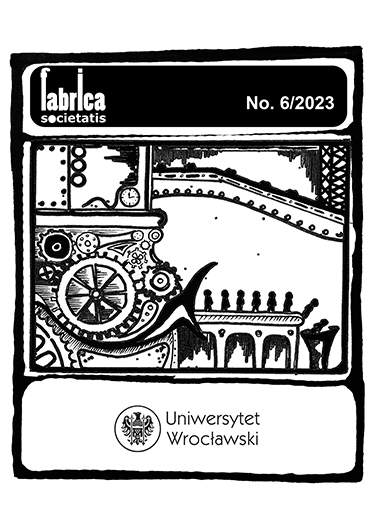

Artykuły

Gender-based domestic violence remains a significant and complex problem in Ukraine, despite ongoing legal changes. The patriarchal culture, the associated rigid gender role divisions and gender stereotypes continue to be its important determinants. The aim of this article is to present the experiences of domestic violence in the lives of Ukrainian migrant women who arrived in Poland after 25th February 2022: to reconstruct the varied violent behaviours (constituting psychological, physical and economic violence) displayed by men towards women and to establish the extent and strength of control exercised by men resulting from the role-play scenario. On the basis of the research material obtained, this control can be seen on a continuum – from weak, acceptable and sometimes even justifiable, resulting from the differently defined family social roles of men and women and the acceptance of their unequal status within the family, to strong, unacceptable and not justifiable through references to social roles and gender norms related to patriarchal culture. The empirical basis is provided by the results of the qualitative research carried out in 2023 within the project “Patters of violence in Ukrainian families and their achoring in the axionormative structures of the Ukrainian population moving to Wrocław due to the armed conflict with the Russian Federation”.
Dmytrashchuk, O. (2020). National Police Units As Subjects In The Field Of Prevention Of Domestic Violence (On The Example Of The Activities Of District Police Officers). Knowledge, Education, Law, Management 6(34), Vol. 3, p. 44–48 [dostęp: 27 grudnia 2023]. Dostępny w Internecie: https://kelmczasopisma.com/jornal/28.
Franchuk, V., Kuntij, A. (2020). Charakterystyka kryminalistyczna przestępstw przemocy domowej zgodnie z ustawodawstwem Ukrainy. Edukacja – Terapia – Opieka 2, s. 211–220 [dostęp: 21 grudnia 2023]. Dostępny w Internecie: https://cejsh.icm.edu.pl/cejsh/element/bwmeta1.element.ojs-doi-10_52934_eto_23.
Giryak, S. (2020). Formation Of Criminal Law Countering Violations Of The Rights And Interests Of Women In Ukraine. Knowledge, Education, Law, Management 6(34), Vol. 3, p. 32–36 [dostęp: 28 grudnia 2023]. Dostępny w Internecie: https://kelmczasopisma.com/jornal/28.
Kvale, S. (2004). Interviews. Wprowadzenie do jakościowego wywiadu badawczego. Tłum. S. Zabielski. Białystok: Trans Humana.
Nowacka, M. (2020). Uznanie przemocy wobec kobiet jako zagrożenia dla tradycyjnego podziału ról płciowych w Polsce. Miscellanea Anthropologica et Sociologica 21(2), s. 74–87.
Pantylej, V., Lozynskyy, R. (2013). Stary problem nowej Ukrainy. Niebieska Linia 2/85, s. 13–17.
[Szymkiewicz, B.] (2009), Zniewolenie i kontrola. Przemoc domowa jako łamanie praw człowieka. Niebieska Linia 5 [dostęp: 28 grudnia 2023]. Dostępny w Internecie: https://www.niebieskalinia.pl/aktualnosci/aktualnosci/zniewolenie-i-kontrola-przemoc-domowa-jako-lamanie-praw-czlowieka.
Wrzesień, W., Żurek, A. (1999). Wzory współzależności pomiędzy jednostką a rodziną. Roczniki Socjologii Rodziny 11, s. 73–86 [dostęp: 17 grudnia 2023]. Dostępny w Internecie: https://repozytorium.amu.edu.pl/server/api/core/bitstreams/2769a189-2aa1-4979-aa98-c3001c35b775/content.
Zielińska-Poćwiardowska, I., Sosnowska-Buxton, P. (2023). Przemoc domowa w Polsce: zaproszenie do podjęcia socjologicznej analizy zjawiska. Studia Socjologiczne 2 (249), s. 131– 154 [dostęp: 18 grudnia 2023]. Dostępny w Internecie: https://cejsh.icm.edu.pl/cejsh/element/bwmeta1.element.desklight-54942df8-c933-44f8-8ac1-710c972c522e.
Żurek, A. (2016). Przymus kreowania ról rodzinnych. W: I. Przybył, A. Żurek (red.), Role rodzinne. Między przystosowaniem a kreacją. Poznań: UAM, s. 17–27 [dostęp: 17 grudnia 2023]. Dostępny w Internecie: https://repozytorium.amu.edu.pl/items/7bc99c73-0211-428f-a1bd-9e3b52bd7e24.

This work is licensed under a Creative Commons Attribution-NonCommercial-NoDerivatives 4.0 International License.